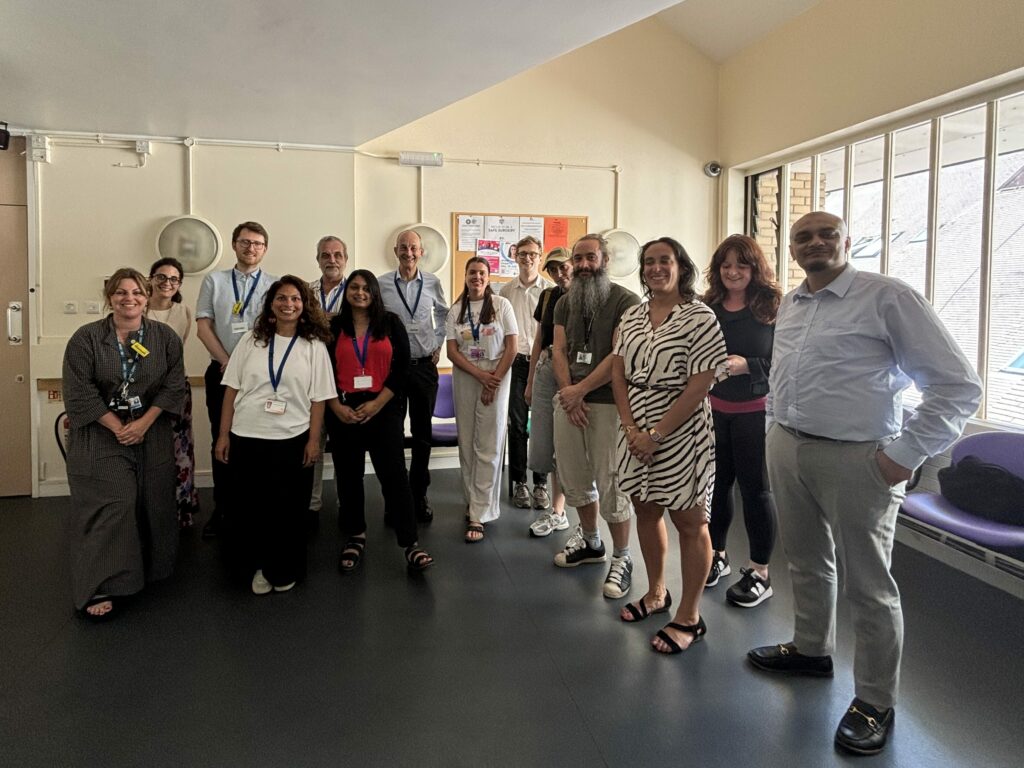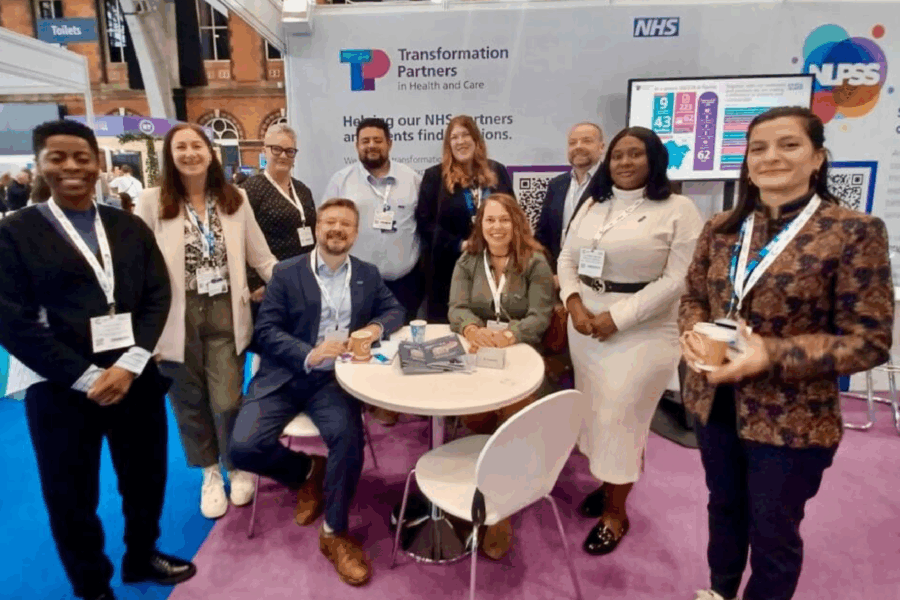Hospital to community
In 2024/25 our teams supported clients to evolve how they deliver the best care for patients and populations in their communities and closer to home. This work will continue and expand as the “left shift” from hospital to community becomes the new, better way of doing things for the NHS, improving patients’ outcomes and wellbeing.
“The best bed is your own bed”: Patients recover faster and retain more independence if they are in the place they call home.

Reducing dental inequalities and improving oral health outcomes for children and young people in north central London
North Central London’s Dental Transformation Programme shows what’s possible when dental care is prioritised and shaped locally. The Integrated Care Board has co-developed targeted workstreams to transform dental outcomes for children and young people. We played a key role in coordinating and delivering this programme, with engagement with local authorities, NHS England, dental public health consultants and local dentists to identify shared priorities and inequalities.
Addressing oral health inequalities
A deep-dive exercise into dental health inequalities in NCL identified a clear link between deprivation and poor oral health outcomes in children, including hospital admissions for tooth decay. Children from the most deprived wards experience more severe tooth decay and often face associated anxiety, school absence, and long-term health risks. The ICB made a strategic decision to reinvest underspend into dentistry to improve access and outcomes. Targeted initiatives were co-produced with local communities and organisations to increase engagement and uptake.
Preventative interventions for children and young people
A Supervised Toothbrushing Programme was co-designed with local dental practices and boroughs, targeting over 1,000 3 to 4-year-olds in over 70 early years settings in the most deprived wards to promote good oral health. The programme is reinforced by educational materials for parents and policies promoting healthier food and drink choices.
A staff member shared: “Children enjoy it and…even prompt each other to brush the back teeth themselves.”
The ICB also invested in Giving Up Loving Pop (GULP), delivered by Tottenham Hotspur Foundation to children aged seven to 11 in 20 schools in high-deprivation areas, focusing on sugar reduction, hydration, oral hygiene, and physical activity.
GULP received royal recognition with a visit from His Royal Highness, The Duke of Edinburgh, at Tottenham Hotspur Stadium, pictured here.

Better for children
- Toothbrushing twice daily rose from 47.1% to 61.8%, and children demonstrated better recognition of high-sugar drinks such as smoothies and milkshakes.
- 75% of classes taking part in GULP were in the 20% most deprived areas.
- Preference for water over high-sugar drink alternatives in school increased from 51.1% to 79.2%, and during sports from 21.3% to 49.7%.
Better for the NHS
The programme is improving dental access and outcomes for children, helping to embed healthier habits at a young age. It will prevent more children from developing dental issues and other health-related issues later in life, particularly in areas of higher deprivation in north central London.
Improving access to dentistry
The programme is improving dental access and outcomes for children, helping to embed healthier habits at a young age. It will prevent more children from developing dental issues and other health-related issues later in life, particularly in areas of higher deprivation in north central London.
71,650 additional Units of Dental Activity were allocated across 41 local dental practices, providing thousands more patients from deprived areas with access to dental care. Practices also introduced extended hours, including after-school slots for children to further cut waiting times.
Reduced treatment delays
To address the backlog of children needing dental work, including extractions under general anaesthetic, North Central London Integrated Care Board funded additional capacity, including weekend clinics at community dental practices.
Better for children
- Data from local dental practices shows waiting times for appointments fell from 20 to 17 weeks despite an increase in the number of referrals.
- There was a 228% increase in paediatric general anaesthetic procedures within the community dental service. This reduced referrals to secondary care by 85%.
A community dentist shared feedback from a parent of a child who underwent an extraction, thanking the service for the availability of a weekend appointment, ‘‘as she knew…the treatment, which involved some stainless-steel crowns, could have ended up being secondary care-based extractions under general anaesthetic had she waited too long”.
The programme was underpinned by robust governance, reporting, and assurance frameworks. The success of the Dental Transformation Programme is a testament to the strength of system-wide teamwork in delivering meaningful, sustainable change.
Hepatitis C pilot successfully reaches and supports the health needs of east London’s homeless community
People experiencing homelessness and those who inject drugs face significant barriers to accessing healthcare. This leads to poor health outcomes, including high rates of Hepatitis C and other blood-borne viruses. Nationally, NHS England has made real progress in reducing new infections and increasing treatment uptake for Hepatitis C and blood-borne viruses, but reaching underserved population groups, like people experiencing homelessness, remains a challenge.
The Homeless Health London Partnerships Programme at TPHC was commissioned by the NHS England National Hepatitis C Elimination Programme to deliver a pilot project, aiming to improve access to Hepatitis C care pathways and support NHSE England’s objectives of Hepatitis C virus (HCV) elimination by 2025 and to improve health outcomes.
The pilot in north east London was co-designed in partnership with both primary and secondary care healthcare professionals, experts by/with lived experience, local substance misuse service, advocacy organisations and peer outreach services, through a series of focus group sessions.
The TPHC team worked with Health E1 Homeless Medical Centre, a specialist practice serving people experiencing homelessness in Tower Hamlets, one of London’s most deprived areas. The team ran training and education sessions with all practice staff, covering each blood-borne virus, stigma awareness and trauma-informed care. The innovative pilot model offered integrated rapid blood-borne virus testing (Hepatitis C, HIV and Hepatitis B), peer outreach support, harm minimisation, wound care, liver health screening, tuberculosis screening, vaccinations, and access to a holistic primary care clinic through a drop-in model.
A service user told us: “This was the first time I felt I was being treated like a human being by a health service.”
Also that:
“I wouldn’t have come in if I had to make an appointment or speak to a receptionist. I’ve been turned away too many times before.
It helps when someone has lived your life and can explain things in your language.”
Pictured below (seventh from left), Dr Chris Streather, Regional Medical Director at NHS England – London, visited Health E1 following World Hepatitis Day to learn more about the drop-in clinic.

Better for Londoners from minoritised backgrounds
The pilot reached 104 people, many of whom were injecting and/or smoking drugs, sharing equipment and were rough sleeping at the time. The clinic saw more women and people from ethnic minority and migrant backgrounds than typically seen by homeless and drug treatment services.
Key clinical outcomes from the six-month pilot:
- Three people were newly diagnosed with Hepatitis C infection and referred to the specialist team at Barts Hospital for follow up. Two have completed their treatment.
- One person living with HIV who had previously disengaged from HIV care has re-engaged after attending a drop-in clinic. They are supported by a peer support worker from Positive East.
- Integrated support and other health interventions offered on site, such as needle exchange and wound care, enabled nine people to avoid hospital admission.
The project also supported broader health and social needs, making nine referrals to the local substance misuse service, carrying out 98 fibroscans to measure liver stiffness, and registering 10 patients with Health E1 Homeless Medical Centre.
Better for Londoners
The Hepatitis C pilot at Health E1 shows that a holistic primary care service offering a welcoming environment for people can successfully engage with underserved individuals in London, identifying critical health needs and successfully linking individuals to life-saving treatment and support.
“The partnership worked well to help bring people in – it was a good setup…We caught infections early and got people into care who would never have come to hospital.” Member of the pilot team
“I don’t see why this wouldn’t work in other areas, rough sleeping isn’t unique to Tower Hamlets.” Member of the pilot team
By facilitating new GP registrations and making referrals to other services, including housing, mental health, drug and alcohol, or specialist hepatology clinics, depending on need, people’s health outcomes are improved.
Better for the NHS
This pilot demonstrates the power of integrated models of care with peer outreach support, co-designed with experts by experience. Proactive care has the potential to reduce emergency hospital attendance and the high costs it incurs.
The evaluation report from the Health E1 pilot is due to be published in 2025, and a second pilot is scheduled for 2025 at a non-specialist practice in Croydon, building on the learning to date.
Engaging on a Neighbourhood Health strategy with staff at CLCH
In 2024/25, Central London Community Healthcare NHS Trust (CLCH) developed a powerful new corporate strategy to underpin integrated, innovative working with its partners and communities as part of a Neighbourhood Health Service.
The Trust asked TPHC’s specialist communications and engagement team to engage with CLCH staff, building their understanding of how the strategy will empower them to work differently and gathering information on the opportunities and challenges they see.
We developed simple messaging and held events with over 130 clinical, non-clinical and corporate staff, mainly in-person in each of the Trust’s five divisions, and also online.
Staff who engaged were interested and positive about the strategy and appreciated having a safe space to raise concerns, including potential challenges with implementation.
Our report for the Trust’s leadership summarised the key themes from staff engagement and recommendations for action to inform how they implement the five-year strategy, launching in 2025/26. We also developed a toolkit and resources for senior staff and team leads to undertake further engagement.
Better for patients
Staff had good ideas about how CLCH’s new corporate strategy will help them transform the health and wellbeing of the communities they serve. These included spreading good practice and operationalising new initiatives more quickly, educating and working more closely with partners, supporting patients to take greater control of their own health, and making better use of technology to free up clinical time for patient care.
Better for the NHS
Staff ideas included ways to reduce duplication and bottlenecks in pathways, and to make better use of technology to free up clinical time for patient care. These will improve efficiency and make better use of staff time and effort.
Improving respiratory care in north central London

In 2024/25, TPHC supported North Central London Integrated Care Board (NCL ICB) on several critical projects to improve healthcare delivery and patient outcomes. These included respiratory diagnostic hubs, long-term conditions clinical networks, and the local maternity and neonatal system.
We supported NCL to set up respiratory diagnostic hubs to address a significant backlog in spirometry testing following the pandemic. The work with system stakeholders resulted in the creation of new clinical pathways, a new way to search cases that identified over 5,500 high-risk patients, the establishment of multidisciplinary teams (MDTs) with specialist expertise, and training for over 150 staff.
Better for patients
Thanks to enhanced training for GPs and faster testing, resulting in a quicker diagnosis, patients are being diagnosed at an earlier stage of their illness, helping them to stay well for longer. Patients now have access to the same, high-quality service, wherever they live in north central London.
Better for the NHS
The service has enhanced collaboration and improved efficiency, cutting down on delays and duplication so that it is more sustainable.
Improving care for people with long-term conditions in north central London
We supported the review and future strategy of North Central London’s Long-Term Conditions Clinical Networks, as they move from multiple, individual networks focusing on a single condition in isolation to a more holistic approach, looking at multiple long-term conditions in the round.
Our report set out principles, benefits and critical success factors to develop governance arrangements and structures and the successful creation of new Long-Term Conditions Clinical Network structures.
Better for patients
A holistic approach and integrated improvement approach by clinical networks to long-term conditions pathways will improve preventative and proactive care for patients, particularly older people, people from deprived communities and people from ethnic minority backgrounds, who are at greater risk of having multiple long-term conditions.
Better for the NHS
A holistic approach will enable more shared learning and innovation, which will improve NHS efficiency.
TPHC has delivered excellent support for our work on the development of the Long-Term Conditions Clinical Networks and the work on spirometry. They have been committed, professional, extremely thorough and determined to stick with both projects through all the challenges. It has felt like one team and that they were as passionate about project success as I was, which was really gratifying. Both projects also required working across organisations with a lot of ambiguity, and both times they were equally effective and skilled at that. Big thanks.”
Amy Bowen, Director of Proactive Care and Long-Term Conditions for NHS North Central London Integrated Care Board
Improving maternity care in north central London
We assisted North Central London Integrated Care Board’s Local Maternity and Neonatal System to reduce inequalities. The work included:

- testing ways to increase referrals of Black women and birthing people to perinatal mental health services
- enhancing Maternity and Neonatal Voices Partnerships
- streamlining Local Maternity and Neonatal System governance, communications and processes for sharing learning
- supporting the system’s Maternal Medicine Network
- improving language services.
Now there is a stronger focus on embedding anti-racist practice, a better understanding of perinatal mental health, increased collaboration between maternity and mental health teams, more support for Maternity and Neonatal Voices Partnerships, which are service user-led groups, and more feedback about neonatal services.
Four trusts in North Central London with maternity services have a Maternity and Neonatal Voice Partnership (MNVP) representing women and families who have used maternity and neonatal services, and including professionals who provide these services.
As a result of our work:
- MNVPs have received additional funding and resources, enabling them to hear from more women and families
- service user leads are now becoming involved in NCL-wide projects, ensuring user voices are heard at a system level
- we are helping service user-led groups to strengthen links with community groups to better understand the experiences and priorities of people who experience the worst health outcomes. This feedback will inform improvements to services.
Better for patients
The changes are addressing some of the most significant barriers to improved patient safety, outcomes and experience.
- Feedback from parents has identified a lack of communication and information about the neonatal repatriation process (where patients are moved between different hospitals according to their needs). This is being fed into an NCL review of antenatal education and a regional review of the NHS’s Operational Delivery Network service specification.
- We worked with NCL trusts to develop a standard operating procedure for on-demand interpreting and are supporting a pilot of the CardMedic interpreting and translation tool for medical staff. We are also working with the language service provider to improve its performance and support effective contract monitoring. Key performance indicators, pilot results, and feedback will inform system-level work to remove language barriers so staff across north central London trusts can communicate with service users from all backgrounds.
Better for the NHS
These improvements for patients will help make the most of NHS resources in north central London.
TPHC’s programme management skills, ability to engage stakeholders and work flexibility has given momentum to the Equity and Equality Action Plan. Their experience and network connections have been incredibly valuable in helping us learn from others and work more productively. They are an absolute joy to work with and have added huge value to the team, we are very grateful for your support and expertise.
Sumayyah Bilal, Assistant Director of Maternity & Neonates Quality, Service Development & Commissioning for NHS North Central London Integrated Care Board
Curious to see how we can make a difference?
Interested in hearing more about how we have helped tackle health inequalities? Contact us for an informal chat.
email us at:rf-tr.tphc-communication@nhs.net



